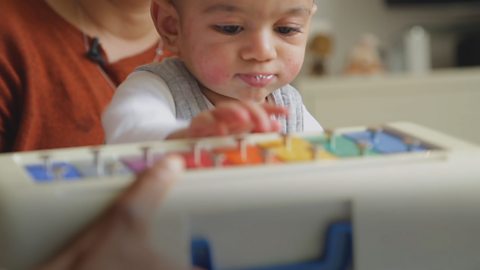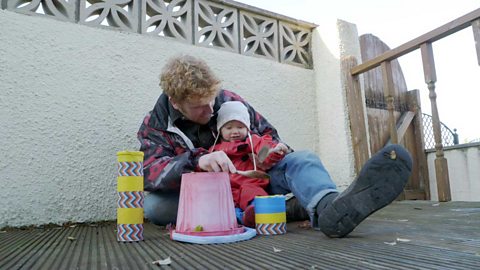Music can be a lot of fun for kids, but it is also a great learning tool.
Lots of babies love to boogie but did you know that they can also understand rhythm and even learn language through music?
Sharing your love of music can have a wide range of exciting benefits for your baby. We’ve listed a few amazing baby music facts below:

Why is music and singing good for babies?
1. Babies understand rhythm (and love to make music!)
suggests that newborn babies are able to pick up on patterns in rhythms very early on. In other words, they can detect the beat in music.
Dr Michelle Peter, a child language researcher, says that playing music can be a great way of getting kids to develop memory and listening skills.
“Things like tapping out rhythms and seeing if a child can copy it is a great way of helping them with their development. It can be a great bonding experience too.”
She says that giving kids makeshift instruments can be a fun way of getting them to learn about different sounds at home.
“It doesn’t have to be anything expensive. It could just be a saucepan and a spoon, or even (with supervision) blowing on bottles filled with different levels of water.”
She adds that picking up on rhythms “can boost the kind of skills that are important for language development, in particular the ability to detect patterns.”
So don’t feel like you have to play Mozart around the house. Anything with a tune will capture your baby’s attention and help their development.
2. Singing in any language is soothing for babies
Babies start to recognise their parent's voice during pregnancy. That’s why singing to babies from early on can be a great way to bond with them.
But if you feel like you’re tone-deaf, there’s no need to worry: babies are very forgiving! Researchers have even found that lullabies in any language can calm babies, reducing their heart rate and how often they blinked amongst other things.
“In the newborn phase your own child will love the sound of your voice,” says Dr Peter.
“I think it happens quite naturally for a lot of people when they have a small baby, they just rock them and sing to them.”
Singing your baby to sleep may not work for everyone, but music can still calm your baby down at key moments says Dr Peter.
“So, for example, a nappy change can be an opportunity to sing, which might also stop them wriggling around. It allows you to have that face-to-face interaction and social eye gaze. They can see how your mouth is moving and the sounds you’re making,” says Dr Peter.
She adds that as well as calming babies, singing is a great way of introducing them to language.
If you’re providing them with as much input as possible then that’s great. If you’re doing it through music, then it’s probably more entertaining and there’s a greater chance they’ll take it in.

3. Dance parties boost their mobility
It’s not just babies who enjoy a boogie – adults can join in too.
Games like musical statues and musical bumps can help you wind down or get the endorphins flowing, whatever your age.
Trying different musical games with your little ones can be an opportunity to introduce them to new sounds and movements, as well as improving their coordination and concentration skills in a social environment.
“We’re always playing musical statues at home,” says Dr Peter. “My son loves it and it’s good for growth and motor skills, as well as understanding that you need to be in tune with the rhythm.”
4. Musical TV shows can make learning fun
While screen time can be a contentious topic, TV shows with music can be a great learning tool. Dr Peter says that while “they’re not a substitute for interaction”, they can be useful for parents.
“There’s something quite intrinsic about hearing music that makes you want to pay attention,” says Dr Peter.
“Partly it might be because young children like high pitched tones and we talk to them naturally like that.”
She suggests singing along with your kid to help them pick up numbers or new words.
Programmes like Number 1 Newton Avenue and Numberblocks are great examples of shows that introduce counting via catchy songs.
“Take the good things out of those programmes,” says Dr Peter.
Dr Peter suggests watching the shows together and then incorporating the songs (and any new ideas) into daily life.
“You can put on a show for a few minutes while you’re doing something, as long as you intersperse it with human interaction. Just remember that they’re not a substitute for spending time with you.

5. Songs with actions can help kids build developmental skills
Songs with gestures can help encourage babies’ development.
If a child isn’t talking or singing along, music with actions can be a good way to get them to improve their coordination.
Songs like Incy Wincy Spider, which involve hand gestures can also encourage them to communicate, says Dr Peter.
Your child may be able to sing the words, but if they're not at this point yet, then you can still encourage them to get involved using gestures and actions like pointing and clapping.
She adds: “These are both milestones that require a combination of motor and socio-cognitive abilities so singing is a super fun way to help them build these developmental skills".
6. Nursery Rhymes help babies learn language
Rhyming songs can be a great tool for kids’ learning language. Old Macdonald’s neverending list of livestock might be repetitive to adults, but the simple, similar sounding words have plenty of positives for little ones.
“Rhyming encourages kids to guess which the next word is and helps them remember. The repetition is a great way to support their language development too.”
Michelle adds that nursery rhymes can feature unusual words and are a great way to expand kids’ vocabulary through repetition.
“There’s also comfort for a lot of kids in singing a tune they know with words they recognise,” says Dr Peter.
Find out 7 more benefits of nursery rhymes here.
Next time you’re looking for ways to entertain your kids, why not try some homemade instruments, a dance party, or some sing-along nursery rhymes?
Check out our activities page for more fun music and singing activities for your baby.






